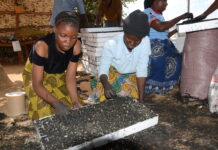Winnie Pooe – Coromandel Farmers Trust Chairperson
Land Reform – An inclusive land reform programme will enable equitable economic participation of all members of the community – creating jobs and improving living conditions. This is according to the Vumelana Advisory Fund (Vumelana), a non-profit organisation that helps beneficiaries of the land reform programme to develop their land in an effective and sustainable way.
Advocate Tembeka Ngcukaitobi recently pointed out that only 35% of land reform beneficiaries are women and over 60% of the beneficiaries of proactively allocated state land are males. This traditional exclusion of women from property and land ownership is a human rights violation. Without rights to land, women’s economic and physical security is compromised.
Vumelana has pointed out that women’s exclusion is evident in the governance of the Communal Property Associations (CPAs) and Trusts, which are the lawful bodies established to manage communal land on behalf of land reform communities. “While some progress has been made, women still struggle in getting fair representation in these structures, hence their voices are not heard” says Mazwi Mkhulisi, programmes manager at the Vumelana Advisory Fund. However, there are notable exceptions, such as the Coromandel Farmers Trust, which should be encouraged.
The Trust is led by 53-year-old, Winnie Pooe who is the chairperson of the Coromandel Farmers Trust, based in Lydenberg. This is one of the communities that Vumelana is currently working with to identify and mobilize private investors that can help the Trust to achieve financial growth.
The Coromandel Farmers Trust was established in 2002 when a group of farm workers consisting of 248 households took a resolution to jointly buy the farm, assisted by the then Department of Rural Development and Land Reform under the Land Redistribution for the Agricultural Development (LRAD) programme. The farm’s 5 800 hectares of land, which was previously used to grow blueberries, now produces maize, soybeans, and for grazing for 120 dairy cattle and 150 beef cattle. The farm also attracts tourists. The Trust intends to repurpose the 40% of the land that is unutilised for blueberry production at a later stage.
Pooe’s journey began in 2002, when she was elected as the Trust’s Deputy Chairperson, a position she held from 2002 to 2005. “I was later re-elected as the trust’s secretary from 2005 to 2008, and in 2020 I was elected as the trust’s chairperson.”
It has not been an easy journey and gaining the trust of both men and women has been a challenge. But the men now recognise the impact and value that women can add to the Trust structure, she says.
According to a 2020 four-part blog series, (on gender and the environment), published by the International Union for Conservation of Nature (IUCN), gender gaps create barriers to sustainable development and livelihoods by restricting women’s access to resources and decision-making opportunities.
The agricultural sector has been a male-dominated environment for decades, resulting in gender power dynamics in which women are expected to be subservient to male authority.
“Working as a woman in a male-dominated industry will always present challenges. At first, I was not taken seriously, not only by men, but also by women who doubted that we could hold such positions within the governing structure. That’s because of the way men and women have been socialised,” notes Pooe.
Despite these misgivings, Pooe is encouraged by the growth of the business and by the shifting mindset in the Trust. She notes that men are realising that women can lead just as well as them and can take decisive action when the situation calls for it. Women now believe that they too can do it, although many women are still shy to raise their hands to assume responsibilities because they still do not feel they are equipped to contribute to the development of the governing bodies.
The University of Limpopo’s 2020 analysis of the functionality of CPAs and (by extension Trusts) found a myriad of reasons behind their failure, including lack of accountability, lack of monitoring and inadequate government support, resulting in many being compelled to fend for themselves.
Many women leaders within these structures have pointed out the lack of training and mentorship opportunities as constraints to properly managed governing entities. Pooe is an exception.
“While serving as secretary, I was also elected by the National Agricultural Marketing Council (NAMC) to join other farmers from other provinces to travel to Holland to study export marketing, financial marketing and financial management.” However, she says, on returning home, she was unable to apply these skills, because many of the men in the Trust structure did not give her the opportunity to share the insights she had gained. “This was back then, but now we know how to raise our voices and speak up and fight to be heard.”
She adds that women, sometimes fear the unknown, have a fear of failure, struggle with low self-esteem, do not trust each other as women, and are more comfortable deferring leadership to men.
Skills development programmes for women beneficiaries of the land reform programme are needed to get more women to participate in communal property institutions like Trusts and CPAs. More needs to be done to create awareness of the roles that women can play in such structures of governance. Government also needs to put policies in place to ensure that women are contributing to Trust and CPA structures and are benefitting from them, says Pooe.
Gender parity in the agricultural sector can only be achieved when women are empowered with education and the skills to transform subsistence agriculture into commercially viable enterprises, Pooe concludes.









[…] Source link […]
Comments are closed.